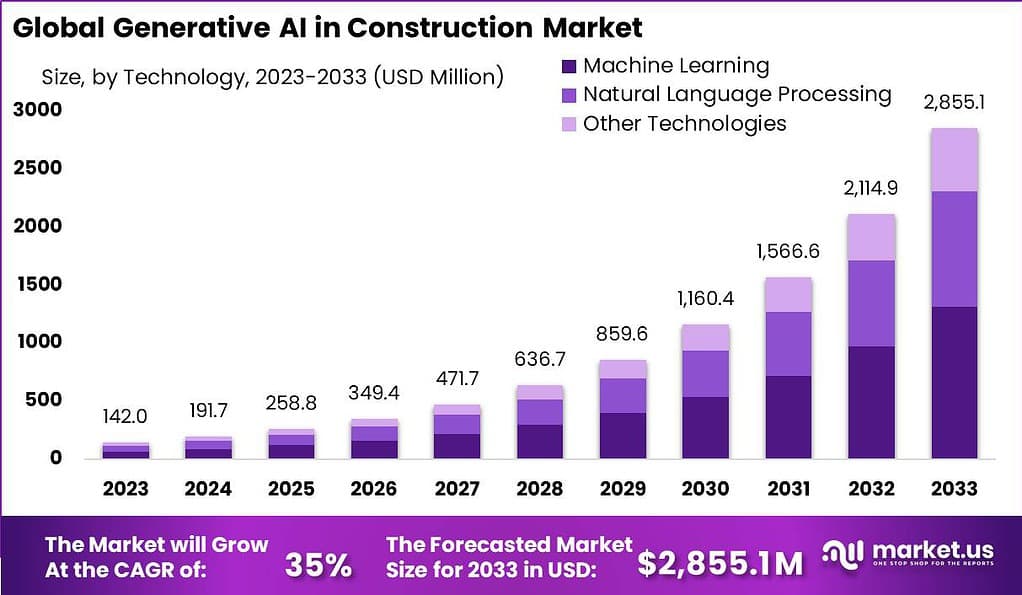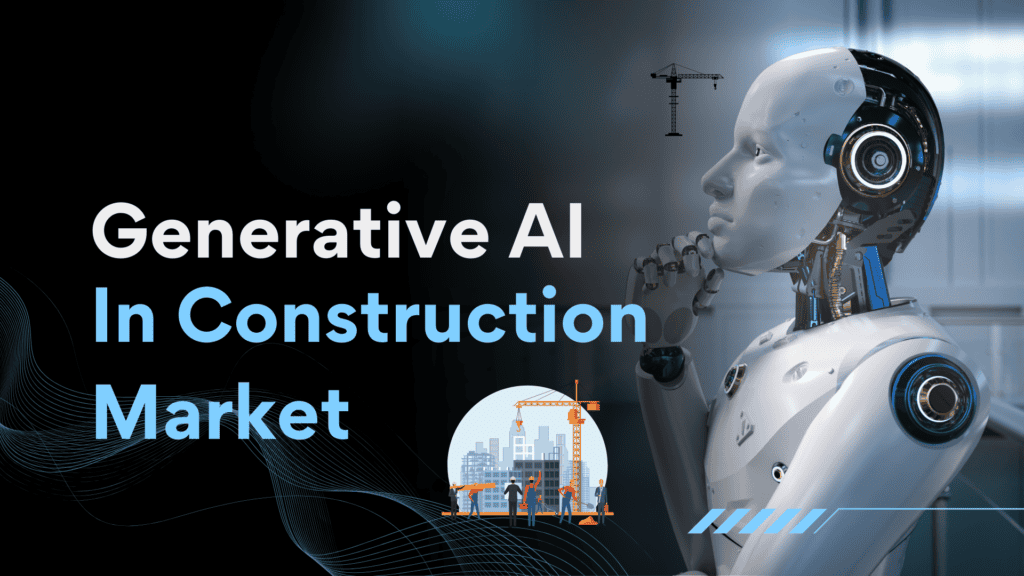Introduction
According to Market.us, The Global Generative AI in Construction Market is poised for significant growth as the sector embraces advanced technologies to improve efficiency, design innovation, and project management. Valued at USD 142 Million in 2023, the market is projected to reach nearly USD 2,855.1 Million by 2033, expanding at a robust CAGR of 35% between 2024 and 2033. This acceleration is driven by the adoption of AI-powered tools for generative design, cost optimization, and risk assessment, enabling construction firms to streamline processes and deliver more sustainable and precise outcomes.
Generative AI in the construction market refers to the use of artificial intelligence technologies that generate design alternatives, optimize processes, and support decision-making across the construction lifecycle. This technology automates many tasks such as architectural design, project scheduling, risk management, and resource allocation by using data-driven algorithms. It allows architects and engineers to quickly explore multiple design options, optimizing for factors like cost, materials, safety, and sustainability.
Top driving factors for the generative AI adoption in construction include the urgent need to increase operational efficiency and reduce project costs. By automating repetitive and time-consuming tasks, generative AI cuts down on manual labor, accelerates project phases, and minimizes waste. Another key factor is the rising push for sustainability, where AI helps optimize material usage and design energy-efficient buildings, reducing environmental impact.

Key Insight Summary
- The market is projected to reach USD 2,855.1 Million by 2033, expanding at a strong 35% CAGR from 2024 to 2033.
- North America held the leading position in 2022, accounting for the largest market share.
- In 2023, construction firms using generative AI for project planning and scheduling achieved a 20% reduction in delays and cost overruns.
- Adoption for site logistics optimization and resource allocation rose by 18% in 2023, boosting efficiency and productivity.
- By the end of 2024, over 50% of top construction firms are expected to integrate generative AI into design, planning, execution, and maintenance.
Role of Generative AI
Generative AI plays a vital role by accelerating and enhancing construction workflows. First, it enables architects and engineers to rapidly generate multiple optimized design alternatives considering safety standards, materials, and environmental factors, improving design quality. Second, AI assists in precise project planning and scheduling by analyzing historical data and real-time conditions to foresee risks and avoid delays.
Third, it supports real-time problem solving on-site through analytic tools processing drone imagery and sensor data, allowing immediate adjustments. Fourth, AI helps optimize resource allocation, minimizing waste of materials and better deploying labor and equipment efficiently. Finally, generative AI contributes to risk mitigation by simulating safety scenarios and enabling proactive measures to reduce accidents and cost overruns.
Emerging Trends
The sector is witnessing several key trends shaping future adoption. One is the integration of generative AI with digital twins, creating real-time, dynamic virtual models of construction sites for enhanced monitoring and long-term planning. Another trend is widespread use of AI-coordinated robotics for autonomous construction tasks, improving safety and operational speed.
Third, there is growth in AI-driven design-to-build workflows that automate compliance with regulations and optimize materials. Fourth, sustainability is increasingly a focus, with AI reducing waste and environmental impact. Lastly, user-friendly AI interfaces are being developed to widen access among construction professionals, improving adoption.
Growth Factors
The rapid uptake of generative AI in construction is propelled by several factors. Improving efficiency by streamlining workflows and reducing project delays is paramount. Secondly, the quest for higher design accuracy and innovation drives AI use, as it explores vast design options quickly. Third, the emphasis on sustainability motivates adoption for minimizing material waste and energy consumption.
Fourth, addressing labor shortages by augmenting the existing workforce with AI tools supports ongoing project demands. Lastly, the growing availability of computing power and investments in AI technologies provide the necessary infrastructure for generative AI deployment.
Top Use Cases
Application of generative AI covers diverse critical areas. Firstly, design generation stands out, where AI rapidly produces multiple practical building iterations that optimize for cost, sustainability, and usability. Secondly, project planning and scheduling are enhanced by AI’s ability to forecast potential risks and optimize timelines.
Thirdly, AI-driven cost calculation ensures accurate budgeting and transparency, avoiding financial overruns. Fourth, AI-powered safety management analyzes worker behavior and site conditions to prevent accidents. Lastly, resource allocation tools help in efficient deployment of manpower, machinery, and materials, minimizing waste and improving productivity.
Customer Insights on Generative AI Use
Customers of generative AI solutions report enhanced decision-making, project transparency, and improved outcomes. AI uncovers deep insights by analyzing vast structured and unstructured data, enabling prediction of customer needs and behavior in property management and construction services.
Clients appreciate personalized content creation, such as tailored project recommendations and communications. Predictive analytics also helps anticipate issues before they escalate, fostering proactive management. Additionally, AI-driven sentiment analysis from various data sources provides businesses with authentic, real-time understanding of customer satisfaction, aiding continuous service improvement.
Key Market Segments
Based on Type
- Residential Construction
- Commercial Construction
- Industrial Construction
- Infrastructure Construction
- Other Types
Based on Technology
- Machine Learning
- Natural Language Processing
- Other Technologies
Based on Application
- Design and Planning
- Construction Optimization
- Project Management
- Other Applications
Top Market Leaders
- Autodesk Inc.
- Dassault Systemes
- Trimble
- Bentley Systems
- Katerra
- Oracle Corporation
- Aurora Computer Services
- Building System Planning Inc.
- IBM Corporation
- Microsoft Corporation
- Other Market Players
Source – https://market.us/report/generative-ai-in-construction-market/












